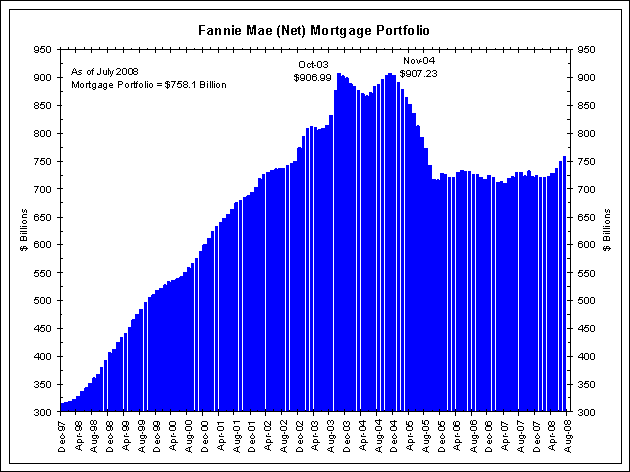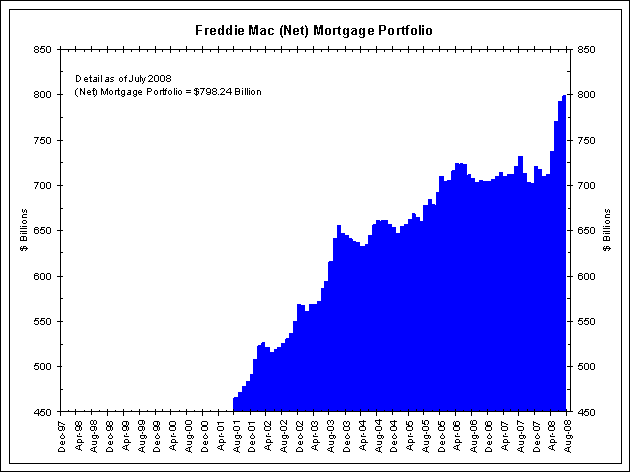-
Naked Capitalism (Blog) – Yves Smith: Preferred Shared Whacked in the Wake of Freddie, Fannie Bailout
The banking system needs to raise several hundred billion dollars of equity, and preferred stock is the lowest-cost way to do that in the public markets. While some sophisticated investors could distinguish between preferreds issued by a sound bank holding company, and preferreds issued by the overleveraged F&F, international investors and domestic retail investors would not have the data or analytics to draw the distinction. The alternative, as I see it, to recapping the US banking system with preferreds is some form of direct government investing in the equity of banks or bank holding companies. That would be even more expensive to the taxpayers – as in at least 10 times more expensive. -
Bloomberg.com – Fannie, Freddie Takeover Jolts Preferred Stock Market
Prices of fixed-rate preferred stock fell an average of 11 cents to 69.8 cents on the dollar this week, including the biggest one-day drop in a decade on Sept. 8, according to Merrill Lynch & Co. index data. The 13 percent decline compares with a 0.8 percent drop in the Standard & Poor’s 500 index in the same time… Paulson’s “actions have damaged the preferred market,” said Thomas Hayden, the investment strategist for Liberty Bankers Life Insurance in Dallas. “Somebody is going to be looking at an issue of Fannie or Freddie preferred shares that were rated AA up until a few months ago. If that’s not money good then what about the small regional bank in some part of the country?” … The takeover was “unambiguously bad” for preferred investors and “likely set a precedent for any future rescue transactions,” Kathleen Shanley, an analyst at bond research firm Gimme Credit LLC in Chicago, wrote in a Sept. 7 report… Freddie preferred shares have lost 83 percent the past two days, while Fannie’s have declined 80 percent, the biggest losers in the Merrill index. The two companies account for about $24 billion of the $190 billion par amount in the index. Forty of the top 50 issuers have declined in the last two days.
Comment Lehman cannot raise money. Bear showed that when the government takes over, common stock holders lose. Fannie/Freddie upped the ante by wiping out the preferred shareholders.
Lehman is at the window, so the government will bail them out to prevent the Federal Reserve from getting stuck with a loss. So, how can Lehman ask others for capital when Ben/Hank can swoop in on any Friday of their choice and wipe them out?
Level 3 securities are not being valued by management as per FASB 157, but by the auditor. Auditors would like to keep their jobs, so they are using the most conservative marks possible when pricing these securities. The Enron/Arthur Anderson debacle has shown that the auditor dies if the financial firm understates losses. This is accelerating losses in the banking system.
Since everyone thinks the Federal Reserve/Treasury will eventually bail out troubled financial firms, they also know this means the common and preferred get wiped out. So, financial firms are finding it impossible to raise capital since the Federal Reserve/Treasury will wipe you out when they step in.
-
The Wall Street Journal – Editorial: Bailout for Billionaires
In structuring his rescue, Treasury Secretary Henry Paulson gave a haircut to holders of both common and preferred stock. In the process, he socked it to many small banks that had much of their capital in Fan or Fred shares. He was right to do so, and he should have wiped them out given how much those holders had profited over the years from a government guarantee. But, strangely, Mr. Paulson also decided to give Fan and Fred’s subordinated debt holders an entirely free pass. Why? And who are these guys? Treasury’s explanation is that it had to do this to reassure the world’s holders of Fan and Fred senior debt. The argument seems to be that if subordinated debt holders took a loss, then senior debt holders might panic and run. And reassuring the Chinese and other holders of Fannie senior debt is the main point of this bailout. -
Real Time Economics (WSJ Blog) – Fan-Fred Turmoil Made Chinese Bankers Nervous
Recent turmoil at mortgage giants Fannie Mae and Freddie Mac sparked major concerns among Chinese bankers before the U.S. guaranteed payment on the firms’ debt, a former Treasury Department official told a congressional panel Wednesday…”Having spoken to some Chinese bankers and discussed with them various options and seeing the deeply concerned reaction that some type of restructuring might be extended to the bonds, not just a change in the equity structure of the companies, and it’s quite clear that it’s a very high level of concern,” said Setser, a fellow on geoeconomics at the Council on Foreign Relations. -
Bloomberg.com – Caroline Baum: Fannie, Freddie Get Bigger Before They Shrink
Paulson’s plan, outlined in a Sept. 7 statement, has three objectives: to provide stability to financial markets, to support mortgage finance and to protect taxpayers. Let’s look at how the plan aims to achieve those goals. To stabilize the mortgage market, the GSEs will “modestly increase their MBS portfolios through the end of 2009” to a maximum of $850 billion each. To support mortgage finance, the Federal Housing Finance Agency, the new GSE regulator, will examine “the fee structure with an eye toward mortgage affordability.” (Translation: Guaranty fees, which have been going up, are coming down.) And to protect the taxpayer, Fannie and Freddie will, what, take more risk?…“The government is placing the GSEs into conservatorship `for safety and soundness concerns,”’ which suggests “taking less risk and reducing taxpayer exposure,” he said. At the same time, the two agencies are being asked “to expand mortgage availability,” Lawler said. “One could argue that anyone doing that in this market is incurring greater risk.”


